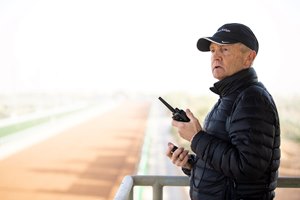Judge Issues Opinion on Wiretap Inclusion in PED Case


U.S. District Judge Mary Kay Vyskocil issued an opinion Dec. 8 explaining her denial last month of motions to suppress wiretap evidence in the horse-doping case involving trainers Jason Servis and Jorge Navarro and approximately two dozen other individuals.
Some defendants, including Navarro, already have pleaded guilty to using, selling, or distributing adulterated and misbranded performance-enhancing drugs in Thoroughbred and Standardbred racehorses. Navarro is due for sentencing Dec. 17.
Other defendants, such as Servis and veterinarian Dr. Seth Fishman, have maintained not guilty pleas. Earlier this year, following rulings from Vyskocil denying previous defense motions, some defendants changed their pleas.
Vyskocil's opinion issued Wednesday followed her ruling in early November in the Southern District of New York in which she denied motions to suppress wiretaps.
Servis and five other defendants filed such motions in August, arguing that FBI agents made "material misrepresentations" to judges when seeking authorization for the wiretaps and had not exhausted "normal investigative procedures" before going to the courts for authorization. According to court documents, the defendants argued extraordinary intrusion of wiretaps required that "normal investigative procedures have been tried and have failed or reasonably appear to be unlikely to succeed if tried or to be too dangerous."
"Their arguments are wholly unpersuasive," Judge Vyskocil offered in her opinion Wednesday. "Before authorizing a wiretap, a court must find that 'normal investigative procedures have been tried and have failed or reasonably appear to be unlikely to succeed if tried or to be too dangerous.' However, 'the government is not required to exhaust all conceivable investigative techniques before resorting to electronic surveillance.'"
In her Wednesday opinion backing the inclusion of captured communications, Vyskocil wrote that "at least 13 judges independently found probable cause to authorize 15 different applications to begin or renew wiretaps."
She further added that "the early investigation of defendants Nick Surick and Jorge Navarro, including but not limited to T-III wiretaps of their phones, established the foundation to pursue much of the evidence that various defendants now challenge. The Surick wiretaps are not—and could not be—challenged by any of the defendants remaining in this case, and Navarro himself never challenged the wiretaps of his phone."
Vyskocil cited incriminating conversations between Surick, a harness trainer, and Navarro, taken from Surick's phone in January 2019, which ultimately led to judge-approved wiretaps on the cell phones of Navarro, Fishman, Christopher Oakes, Lisa Gianelli, Servis, and Dr. Kristian Rhein.
In one cited conversation between Surick and an unidentified third person, Vyskocil writes that Surick turned to Navarro for advice on the use of a difficult-to-detect drug and because "Navarro 'uses (that drug) like (expletive) water.'"
In addition to Navarro, Oakes and Rhein have changed pleas from not guilty to guilty this year. The defendants in the case have been suspended from racing since being indicted in the first part of 2020.
Wiretap evidence is a key component of the government's case against those maintaining not-guilty pleas.
Vyskocil wrote about one captured recording in which Servis and Navarro, intercepted on Navarro's phone, described efforts to "physically hide and 'lock up' certain drugs" due to fears of detection.
Vyskocil added in her written opinion that she considered all the arguments raised by the defendants and concluded that "none warrants the suppression of evidence or a hearing."
